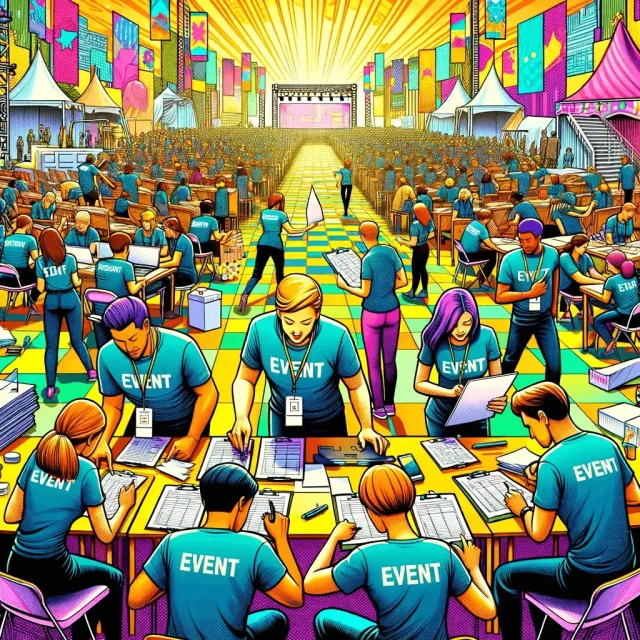Pulling off seamless and unforgettable experiences requires a delicate balance of precision, creativity, and adaptability. Whether it's corporate conferences, music festivals, weddings, or trade shows, event management's dynamic and stressful nature calls for a strategic approach to ensure everything goes off without a hitch. As the events industry evolves, there's a clear trend towards embracing technology as a driving force for success. In this digital age, where technology touches every aspect of our lives, events are no different. Relying on advanced tools has become fundamental to delivering unparalleled experiences to event attendees.
Roster software integrating into the event management landscape brings about a revolutionary change, promising efficiency and a game-changing impact on the entire event lifecycle. In this blog, we will read deep into the intricacies of roster software, uncovering its functionalities, exploring its advantages, and revealing its transformative influence on the world of event management. Come with us on this exciting journey as we discover how roster software has become the secret weapon for successful event planners worldwide.
Understanding the Challenges in the Event Management

Often compared to a high-stakes juggling act, event planning presents unique challenges that can test even the most experienced professionals in arranging for the target audience. As event managers handle the complex tasks of logistics, coordination, and creativity, they encounter various common challenges that can significantly influence the success of an event.
Common Challenges Faced by Event Managers:
Staffing Woes
Assembling a dependable and talented team is an ongoing struggle. Event organisers face difficulties in matching the right individuals with the unique requirements of an event, which frequently results in last-minute changes and concessions.
Scheduling Nightmares:
Creating a well-organised timetable that caters to the different tasks and duties of event personnel is quite challenging. Conflicting availability, diverse skill sets, and the requirement for specific roles make the scheduling process even more complex.
Communication Breakdowns
Event management can be overwhelming due to the large amount of communication needed. A lot of confusion can arise from miscommunications, delays, and information gaps, which can disrupt the smooth flow of the event.
Unforeseen Hurdles
Even with careful planning, events can still face unexpected challenges. Weather conditions, technical issues, or sudden staff shortages can affect even the most organised events.
Examples of Situations that may arise due to Inadequate Rostering
Understaffing at a Music Festival:
During a music festival, insufficient scheduling caused a lack of staff in essential areas. As a result, longer queues at the entrance left attendees frustrated and gave the event a negative reputation despite being anticipated as a standout event of the season.
Overlapping Roles at a corporate conference
The corporate conference faced many difficulties due to ineffective scheduling, causing key staff members to have overlapping roles. This confusion resulted in missed presentations, delayed sessions, and a noticeable decline in the event's overall quality.
The Charm of Roster Software

The emergence of the Staff management tool is a painkiller for event managers. It solves their maze-like challenges, promising improved efficiency, accuracy, and flexibility. This innovative tool is transforming the organisation and execution of event handling.
Overview of Roster Software and its Evolution
Roster software is a digital platform that aims to simplify the complex process of staff scheduling, coordination, and communication. It has evolved from the recognition that traditional manual rostering and spreadsheet-based methods were no longer sufficient for the demands of modern events. Initially, roster software focused on streamlining scheduling processes by offering a centralised hub for managing staff availability, roles, and responsibilities. As time passes, these tools have transformed into comprehensive solutions that incorporate advanced features to cater to the diverse requirements of event managers.
What are the Key Features and Functionalities
Centralised Scheduling:
Roster software provides a convenient platform for event managers to create, modify, and monitor schedules in real-time. Say goodbye to complicated spreadsheets and ensure everyone can access the most up-to-date information.
Automated Notifications:
One thing that stands out is the option to automate notifications. Event organisers can create alerts for shifts, updates, and essential information, ensuring all team members are constantly in the loop and ready to go.
Skill Matching and Staffing:
Roster software has functionalities that enable managers to pair particular skills and availability with roles, guaranteeing that the appropriate individual is assigned to the correct task. This optimisation not only boosts efficiency but also plays a vital role in the overall triumph of the event.
Communication Channels:
Mobile apps enable managers to create schedules while on the move, swiftly update them, and effectively communicate any changes to their employees as the business situation evolves. This functionality assists managers in staying connected with their workforce and making well-informed decisions.
Payroll Integration:
RosterElf collaborates with third-party software solutions like Xero, MYOB, Sage, and Wage Easy. This excellent feature assists businesses in simplifying their payroll procedures and eliminating any mistakes made by humans.
Benefits of Implementing Roster Software in Event Management

Event managers are constantly looking for ways to navigate the complex world of event planning. One solution that has emerged as a game-changer is integrating roster software. This transformative tool offers a wide range of benefits that go beyond traditional methods. The following section will explore three key advantages of using roster software for event management.
Enhanced Staff Scheduling
The key to successful event management lies in effectively using resources, and at the centre of this is staff scheduling. Roster software takes staff allocation to a whole new level of precision. By considering factors like skills, availability, and specific roles, event managers can optimise schedules for maximum efficiency.
With roster software, event managers are no longer limited by the constraints of manual scheduling, which often leads to conflicts and mistakes. Instead, they have the power to create dynamic schedules that can adapt to real-time changes. This ensures that each staff member is assigned tasks aligning with their strengths, resulting in a smoother and well-executed event.
Improved Communication
Communication is the glue that keeps the event management world running smoothly. Roster software boosts communication by providing instant updates and dedicated channels.
With automated notifications, event managers can quickly inform staff members about changes, new tasks, or important updates. This minimises misunderstandings and promotes a collaborative atmosphere where everyone is well-informed. Whether through in-app messaging or email alerts, roster software improves communication efficiency, resulting in a united and responsive event team.
Cost Reduction
In addition to the practical advantages, integrating roster software into event management brings real financial benefits. By effectively aligning staff needs with their skills and availability, event managers can avoid unnecessary expenses caused by mismatched staffing. Moreover, automating scheduling and communication processes saves time, enabling event managers to concentrate on strategic planning and enhance the overall cost-effectiveness of the event.
Addressing Concerns and Misconceptions
Like any transformative technology, roster software in event management has faced its fair share of rumours and misunderstandings. Event managers must separate fact from fiction and overcome doubts about this powerful tool. So, let's bust some common myths about roster software and address concerns about its implementation, the learning curve, and its adaptability.
Common Myths Surrounding Roster Software
Myth 1: Roster Software is only for Large Events
Roster software is not only capable of handling big events, but it also works wonders for smaller gatherings. These tools are incredibly flexible and can easily cater to the specific requirements of events of all sizes.
Myth 2: The Implementation Process is Complicated, and Time Consuming
Implementing roster software is usually a pretty simple task. Numerous solutions come with user-friendly interfaces and reliable providers of help and training to guarantee a seamless transition.
Myth 3: Roster Software is Expensive and Not Cost-Effective
Roster software may seem expensive, but it highly depends on the number of staff; its benefits in terms of time, resources, and avoiding mistakes make it worth it. In the long run, it helps save costs by efficiently managing staff allocation and reducing operational inefficiencies.
What are the tips for Choosing the Right Roster Software?
Here are some important factors to think about when assessing and selecting the perfect roster software that suits your specific event needs:
User-Friendly Interface
Scalability
Customisation Options
Cost Effectiveness
By taking into account these factors, you can easily navigate through the various roster software options and choose a solution that not only fulfils but surpasses the specific requirements of your future event management endeavours. The ideal roster software should seamlessly blend into your workflow, boosting productivity and playing a vital role in the overall success of your events.
Roster software has become an essential tool in event management, completely transforming how events are organised, carried out, and assessed. By simplifying scheduling, promoting teamwork, maximising resource allocation, and enabling data-driven decision-making, roster software empowers event managers to execute successful events flawlessly.
As the field of event management keeps progressing, adopting cutting-edge technologies such as roster software will be crucial in planning and execution and providing extraordinary experiences for participants and attendees.



